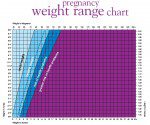All women put weight on during pregnancy; it’s completely natural as your body is adapting and supporting your growing baby. However, it is important that you maintain a healthy weight gain in pregnancy for the health of both you and your baby.
Underweight in pregnancy
Having a BMI of less than 18.5 shows you’re underweight when pregnant. This puts you at risk of complications such as premature birth and an underweight baby. It could also meant that your baby is not getting the necessary nutrients for healthy growth. See our article The foundations of a healthy diet: part one and The foundations of a healthy diet: part two for more information about the role different nutrients play in your baby’s development.
Overweight in pregnancy
If you have a BMI of more than 30 in pregnancy, you are considered overweight. This increases the risk of pregnancy complications, including:
- Miscarriage
- Gestational diabetes
- Pre-eclampsia, see our article, , for more information
- Blood clots
- A large for gestational age baby
- Premature birth
- Increased likelihood of needing an induction, instrumental birth or caesarean.
See our articles: Managing gestational diabetes with a healthy diet, Pregnancy conditions explained: Pre-eclampsia, Reduce the risk of pre-eclampsia through nutrition
Weight gain
Firstly, remember this is NORMAL! The following table shows the average healthy weight gain you can expect during pregnancy. Find out more about weight in pregnancy.
By completing exercise programmes, such as pregnancy Pilates, you will strengthen your core, and reduce the pressure extra weight puts on your body, especially joints.
| WEIGHT | BMI RANGE | WEIGHT GAIN / KG | WEIGHT GAIN / LB |
| Normal | 18.5 – 24.9 | 11.5 – 16 kgs | 25 – 35 lbs |
| Overweight | 25 – 29.9 | 7 – 11.5 kgs | 15 – 25 lbs |
| Obese | 30 + | 5 – 9 kgs | 11 – 20 lbs |
Check your B MI, download a copy of Slimming World’s pregnancy weight range chart here: Slimming World Extended Pregnancy Height Weight Chart
MI, download a copy of Slimming World’s pregnancy weight range chart here: Slimming World Extended Pregnancy Height Weight Chart


![🔔 new blog alert 🔔
It's so important to educate yourself, and understand your rights as you're looked after during your pregnancy, labour, birth and beyond. Whether it's a routine check or a major procedure, YOU decide what happens to your body. 💪💜
In our latest blog, we dive into the importance of informed consent and how healthcare providers must give you clear, unbiased information so you can make the best decisions for yourself and your baby. 📋✨
Key points to remember:
🤝 Your choice matters! Always ask questions and ensure you understand the options.
🚨 You can withdraw consent at any time. It's YOUR body, YOUR baby, YOUR decision.
💕 Even your birth partner can’t make decisions for you, but they can help advocate for your preferences.
👶Post-birth, both parents may share in decisions for your baby, but until then, it’s the pregnant person's choice.
Check out the full post and empower yourself with knowledge. 🔗 [Link in bio]
https://newlifeclasses.com/2024/11/12/the-importance-of-consent-in-maternity-care/
#MaternityCare #InformedConsent #YourBodyYourChoice #EmpoweredBirthing #PregnancyJourney](https://newlifeclasses.com/wp-content/plugins/instagram-feed/img/placeholder.png)